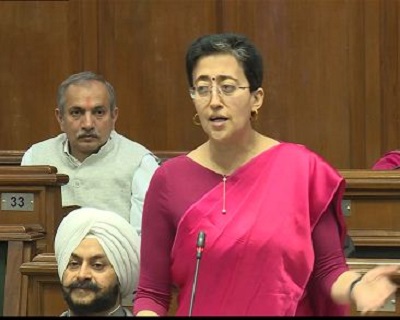New Delhi, (Asian independent) Delhi’s Gross State Domestic Product (GSDP) at current prices during the fiscal year 2023-24 is projected to soar to Rs 11,07,746 crore, marking a notable growth of 9.17 per cent over the previous fiscal year’s GSDP of Rs 10,14,000 crore, according to the Delhi government’s Economic Survey 2023-24.
As per economic survey 2023-24, despite the challenges posed by the COVID-19 pandemic, Delhi’s real GSDP grew at an impressive rate of 8.76 per cent in 2021-22 and 7.85 per cent in 2022-23.
Delhi’s population, constituting 1.5 per cent of India’s total population, contributes nearly 3.9 per cent to the nation’s Gross Domestic Product (GDP).
One of the achievements is the significant surge in Per Capita Income, which rose from Rs 3,76,217 in 2021-22 to Rs 4,61,910 in 2023-24, marking a remarkable 22 per cent increase in just two years. Delhi’s per capita income stands at 2.5 times the national average.
In terms of inflation and unemployment, Delhi has maintained a lower inflation rate compared to the national average, with an inflation rate of 2.81 per cent in 2023.
Additionally, the unemployment rate dropped from 6.3 per cent in 2020-21 to 1.9 per cent in 2022-23, showcasing a favourable employment scenario, as per the report.
Delhi’s fiscal management has also been commendable, with tax collection witnessing an 18 per cent growth during 2022-23. “The city recorded a substantial revenue surplus of Rs 14,457 crores in 2022-23, marking a significant increase from the previous year,” the report stated.
Despite offering a range of free government services including electricity, water, healthcare, education, and public transport, Delhi continues to witness a growing economy and revenue surplus.
A recent study conducted by the Department of Economics and Statistics of 3450 households revealed that almost all households benefited from free electricity at some point during the year, with significant percentages availing free water, healthcare, and education services.
“61.6 per cent of the households had spent all the money saved due to freebies, while 28.4 per cent invested the money in savings and FDs; and 7.2 per cent planned to spend it soon, 2.8 per cent have lent the extra money to friends,” the report stated.
The report further claimed that the city government’s budget allocation for education has remained the highest across all state governments and Central governments.
“In 2022-23, we spent 21.1 per cent of our aggregate expenditure on Education, while the average across India was 13.5 per cent. Delhi’s Gross Enrollment Ratio and Net Enrollment Ratio are higher than India’s average GER and NER. For Senior Secondary classes – the senior most classes in school education, Delhi’s GER is 95.01 per cent while it is 57.05 per cent for India, in 2021-22. This means that children not only take admission in school but finish their school education,” claimed the Delhi government in its report.
“As of January 2024, Delhi’s total bus fleet comprised 7582 buses, out of which 1650 are electric. Total pink tickets (free bus travel for women) issued over 2022-23 add up to 45.44 crore for DTC and cluster buses. Today, Delhi has the 3rd largest number of electric buses in the world, after China and Santiago,” the report added.









